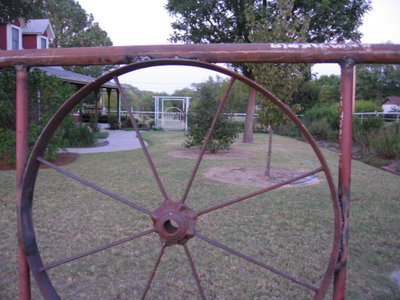We come to that article, finally, that defines what it means to be
Southern Baptist. Not just Baptist, but
Southern Baptist. Evangelism and missions are the two reasons that Baptists in the United States came together in 1845 to form the Southern Baptist Convention. The
North American Mission Board, and the
International Mission Board are the two agencies that make up the organizational bulk, and is the very heart of the Southern Baptist Convention. The SBC is known around the world for its second-to-none missions organization, and their passionate commitment to reaching the lost for Christ with their 5000-plus army of full-time missionaries on the foreign mission field. Since the devastating hurricane disasters in 2005, the North American Mission Board,
NAMB for short, has earned a reputation for first-class rapid response in domestic disaster relief, especially in the areas of providing hot meals and fresh, clean water. NAMB also sends missionaries to plant churches here in America, rural as well as urban, in areas where Baptist churches are not the norm.
Article 11 marks the beginning of the articles that define what we
do, not just what we believe. The first ten articles have laid the ground for what we do, for what we are suppose to do as ambassadors for Christ. Article by article we have created a giant mosaic called a biblical world view. In that biblical world view we have rightly assayed the character of God, of man, the dilemma that exists between God and man, and the reconciliation to that dilemma that is found in the person and work of Jesus Christ. Now that we have all of this information, it is time to do something with it. Coming to these truths for the first time, if you are not a Christian, your first responsibility is to bow the knee, repent of your sins, and confess Christ as your Lord and Savior. After that, it is the responsibility of each and every one of us to go and tell, to make disciples of all the nations, on our block, in our town, and around the world. Let's look now at
Evangelism and Missions.
XI. Evangelism and Missions
It is the duty and privilege of every follower of Christ and of every church of the Lord Jesus Christ to endeavor to make disciples of all nations.
We have the duty to evangelize: Christ commands us not once, but five times to go and make disciples (Matthew 28:18-20, Mark 16:15, Luke 24:46-49, John 20:21-23, and Acts 1:8). Paul tells the Romans that he is under an obligation to preach (Romans 1:14-17). He later states that Christ sent him to preach the gospel (1 Corinthians 1:17). In 1 Corinthians 9:16, Paul adamantly declares that
necessity is laid upon him, and goes on to proclaim "Woe is me if I do not preach the gospel." Paul commands his young brother in Christ, Timothy, to "preach the word" (2 Timothy 4:2). Peter declares in Acts 10:42 that "he commanded us to preach to the people and to testify that he is the one appointed by God to be judge of the living and the dead."
We have the privilege of evangelizing: In Romans 1 above where Paul announces his obligation to preach the gospel, he is quick to add, just one verse later, that he is
eager to preach to those in Rome. In 2 Corinthians 5:18-21, Paul describes the preaching of the gospel as something he has been
entrusted with.
Indeed, what a great duty and privilege it is to evangelize. God does not need us, but He stoops down and uses us, allowing us to share in the joy that He has in the salvation of lost sinners, in the ever-increasing worship brought about by new believers being brought into the fellowship of the redeemed.
The new birth of man's spirit by God's Holy Spirit means the birth of love for others. Missionary effort on the part of all rests thus upon a spiritual necessity of the regenerate life, and is expressly and repeatedly commanded in the teachings of Christ.
I am surprised that no reference to John's first epistle is given in this article's listed Scripture passages. John repeatedly makes the connection between love for God and love for our fellow man ( 1 John 3:10, 11, 14, 16-18, 23, 4:7-12, 19-21). We therefore should have a desire and make every effort to obey our Lord's commands, using the means He has given us, to proclaim the gospel to a lost and perishing world. We preach to the lost, realizing that we were once lost, without hope in this world (Ephesians 2:12), and someone had compassion on us and shared the good news that Jesus saves sinners.
The Lord Jesus Christ has commanded the preaching of the gospel to all nations. It is the duty of every child of God to seek constantly to win the lost to Christ by verbal witness undergirded by a Christian lifestyle, and by other methods in harmony with the gospel of Christ.
The above underlined parts are new to the 2000 version. They represent a strengthening of the 1963 version, which at this point reads:
It is the duty of every child of God to seek constantly to win the lost to Christ by personal effort and by all other methods in harmony with the gospel of Christ. Notice the differences. First, notice that all
Christians are commanded. The five verses listed in the introduction, as well as the passages listed in the "we have a duty" section above, bear clear witness to this fact. Secondly, notice that we are not commanded by one of the apostles, but by Jesus Christ Himself, who is our
Lord. Thirdly, notice that our duty to seek the salvation of the lost is by means of the spoken word. The new wording has replaced
personal effort with
verbal witnessing undergirded by a Christian lifestyle.
Verbal witnessing leaves no doubt that we are to proclaim the gospel to the lost, whereas
personal effort is not quite so clear. Notice also that our walk needs to correspond with our talk. Our lifestyle has to back up, or
undergird our message. We most certainly must live before the world as examples of obedience to Christ, but a godly lifestyle is not enough. We must
go and
tell. We must be
prepared to make a defense to anyone who asks [us]
for a reason for the hope that is in [us] (1 Peter 3:15). As Paul points out in Romans 10:13-15, salvation comes primarily by means of the preached word:
For "everyone who calls on the name of the Lord will be saved." But how are they to call on him in whom they have not believed? and how are they to believe in him of whom they have never heard? and how are they to hear without someone preaching? and how are they to preach unless they are sent? As it is written, "How beautiful are the feet of those who preach the good news!"
Conclusion
When it comes to evangelism, we are all evangelists. We should, therefore, prepare ourselves by constant study and meditation upon God’s word. We should be eager to tell the world about our great Savior. When it comes to missions, we only have two options: to go or to send. If we go, our churches, through the Cooperative Program, send us out with their funding and their prayers. If we send, our joyful giving to our church, through the Cooperative Program and our constant, earnest prayers are a must.
Verses Listed Under Article 11: Genesis 12:1-3; Exodus 19:5-6; Isaiah 6:1-8; Matthew 9:37-38; 10:5-15; 13:18-30, 37-43; 16:19; 22:9-10; 24:14; 28:18-20; Luke 10:1-18; 24:46-53; John 14:11-12; 15:7-8,16; 17:15; 20:21; Acts 1:8; 2; 8:26-40; 10:42-48; 13:2-3; Romans 10:13-15; Ephesians 3:1-11; 1 Thessalonians 1:8; 2 Timothy 4:5; Hebrews 2:1-3; 11:39-12:2; 1 Peter 2:4-10; Revelation 22:17.
Previous Lessons:
Baptist, What Do You Believe? #1 (An Introduction)
Baptist, What Do You Believe? #2 (On the Doctrine of Scripture)
Baptist, What Do You Believe? #3 (On the Doctrine of God)
Baptist, What Do You Believe? #4 (On God the Father)
Baptist, What Do You Believe? #5 (On God the Son
Baptist, What Do You Believe? #6 (On God the Holy Spirit)
Baptist, What Do You Believe? #7 (On the Doctrine of Man)
Baptist, What Do You Believe? #8 (On the Doctrine of Salvation)
Baptist, What Do You Believe? #8 (Continued) (On the Doctrine of Salvation)
Baptist, What Do You Believe? #9 (On God's Purpose of Grace)
Baptist, What Do You Believe? #10 (On the Doctrine of The Church)
Baptist, What Do You Believe? #11 (On Baptism and the Lord's Supper)
Baptist, What Do You Believe? #12 (On The Lord's Day)
Baptist, What Do You Believe? #13 (On The Kingdom of God and Last Things)
 For the last couple of weeks I have been welding a gate together from scrap oilfield pipe, and an antique spoked wheel. We have always wanted an exit from the front yard west into the pecan orchard, so as cooler weather arrived I began the project. I made the breach in the fence over a month ago, and then had the hardest time finding the material needed to do what I wanted to do. The gate is up in the gap but I am still working on the nifty little latch. I should be finished with all but the brushing down and painting this weekend. This gate is the widest of my three yard gates because the other two were too small to allow our new mowing machine into the front yard.
For the last couple of weeks I have been welding a gate together from scrap oilfield pipe, and an antique spoked wheel. We have always wanted an exit from the front yard west into the pecan orchard, so as cooler weather arrived I began the project. I made the breach in the fence over a month ago, and then had the hardest time finding the material needed to do what I wanted to do. The gate is up in the gap but I am still working on the nifty little latch. I should be finished with all but the brushing down and painting this weekend. This gate is the widest of my three yard gates because the other two were too small to allow our new mowing machine into the front yard. This Sunday next I suspect that Pastor Rod will be discussing gates, as he has worked his way through The Sermon on the Mount to that point (Matthew 7:13, 14) where Jesus commands his hearers to “Enter by the narrow gate. For the gate is wide and the way is easy that leads to destruction, and those who enter by it are many. For the gate is narrow and the way is hard that leads to life, and those who find it are few.".
This Sunday next I suspect that Pastor Rod will be discussing gates, as he has worked his way through The Sermon on the Mount to that point (Matthew 7:13, 14) where Jesus commands his hearers to “Enter by the narrow gate. For the gate is wide and the way is easy that leads to destruction, and those who enter by it are many. For the gate is narrow and the way is hard that leads to life, and those who find it are few.".  I remember the first time I heard a message from this passage from Thom Smith, now pastor of Randolph Street Baptist Church, in Charleston, West Virginia. It must have been twenty-five years ago. The thing I remember him stressing most was that most people draw the wrong analogy from the two gates. The two gates do not represent belief versus non-belief, but rather the one, true belief versus all of the multitude of false beliefs.
Pastor, Sunday-school teacher, Brother, as you preach, teach, walk, what kind of gates are you building for people to walk through?
I remember the first time I heard a message from this passage from Thom Smith, now pastor of Randolph Street Baptist Church, in Charleston, West Virginia. It must have been twenty-five years ago. The thing I remember him stressing most was that most people draw the wrong analogy from the two gates. The two gates do not represent belief versus non-belief, but rather the one, true belief versus all of the multitude of false beliefs.
Pastor, Sunday-school teacher, Brother, as you preach, teach, walk, what kind of gates are you building for people to walk through? Be sure to check out all of the other bloggers photos at the Friday Photo Group on Flickr.
I have started a set on Flickr named Making Gates that I will be adding to as my gate project progresses. Check it out.
Be sure to check out all of the other bloggers photos at the Friday Photo Group on Flickr.
I have started a set on Flickr named Making Gates that I will be adding to as my gate project progresses. Check it out.



















 This is suppose to be the header for recent posts, but since I moved to the "new" blogger, it no longer works.
This is suppose to be the header for recent posts, but since I moved to the "new" blogger, it no longer works.
 This header for archived posts, is also redundant, but since I have them here, they will stay, for a while.
This header for archived posts, is also redundant, but since I have them here, they will stay, for a while.

